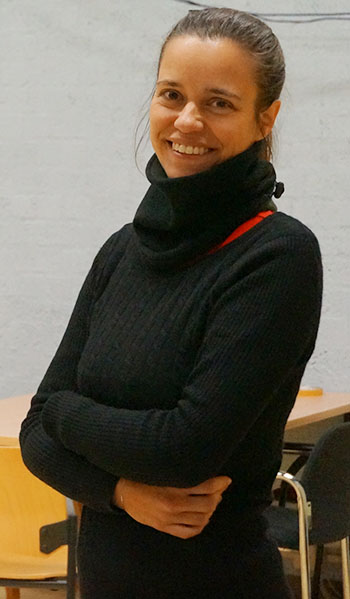 TWO young inventors are using cutting-edge design to help people with mobility issues – and those who have problems feeding themselves.
TWO young inventors are using cutting-edge design to help people with mobility issues – and those who have problems feeding themselves.
Imperial College London students Joon Faii Ong and Lise Pape were both shortlisted at the AXA PPP Health Tech & You Awards, with Lise eventually coming away with first prize.
Lise’s wining entry is the Path Finder shoe, which helps people who suffer from ‘freezing of gait’, described as feet remaining ‘glued to the floor’. Four out of ten people with Parkinson’s disease suffer from falls each year, costing the NHS £2.3bn every year.
Lise’s company, Walk with Path, has developed shoes mounted with lasers that project green lines ahead as the person walks, activated by a sensor in each heel that monitors the user’s walking pattern and pace. The shoe produces a line, which provides a visual cue to step ‘over’.
Joon Faii Ong’s device is an unobtrusive glove, which aids people with debilitating hand tremors.
Faii, a medical student at Imperial College London, devised the idea of the GyroGlove after seeing an elderly woman with Parkinson’s struggle to feed herself in hospital due to severe hand tremor.
The glove uses gyroscopic engineering principles mixed with hi-tech sensors to counteract the tremors and stabilise the hand.
The effect feels like moving a hand in thick treacle, where deliberate movement is permitted, but tremors are dampened.
Faii said: “We are fortunate to have a potentially impactful invention. Yet it takes critical, industry-specific knowledge to fulfil that potential, and turn the GyroGlove from a prototype into a commercial product.
“We most certainly look forward to working with Design Council as we further refine the GyroGlove.”
John Mathers, chief executive at the Design Council, said: “The independence and freedom inventions like Lise and Faii’s can give to people with debilitating conditions is inspiring.
“Their combination of entrepreneurial spirit and designer’s minds are truly innovating the healthcare landscape. It’s a fine example of how design can improve lives, and Design Council is proud to have helped them on their way to market.”
James Freeston, marketing director at AXA PPP healthcare, said: “Lise’s innovative thinking around how to tackle trips and falls in people with Parkinson’s was particularly creative, and we’d like to congratulate her again and wish her the best on the journey of getting this possibly life-changing device to market.”
Around 10 million people worldwide and 127,000 people in the UK are affected by Parkinson’s, a progressive neurological condition that affects movement.
There is currently no cure for the disease, and medication used to control it can have side effects including involuntary movements and impulsive behaviour.
Other finalists included Dermaspray, by ANN Medical, which aims to enhance the quality of life for arthritis sufferers and other patients with painful joints and limited dexterity.
The device has an automated, no-touch design that sprays medication onto a target joint. Even users with severely limited dexterity will be able use the spray, as there is no need to open packaging or apply medication by hand.
The awards, now in their second year, are a joint initiative led by AXA PPP healthcare, the thinktank 2020health and the Design Museum.
PICTURED: Imperial College student Lise Pepe

